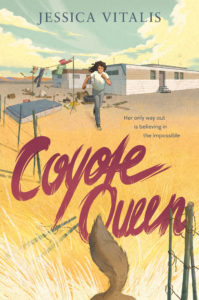“No Easy Answers: Using A Twist of Magic to Make a Tough Topic Accessible”
In the nearly twenty years that I’ve specialized in middle grade literature, I’ve learned that if there’s one defining characteristic of the category, it’s that these stories end in hope. Not that the characters always get their happily ever after, but they do always learn something new about themselves––or the world––that leaves the reader feeling like the characters they’ve developed an emotional connection with are going to be okay––maybe not today or tomorrow, but in the long run.
This unspoken promise that everything will turn out in the end is part of what makes middle grade books such a delight to read––in a world where it’s sometimes hard to feel optimistic, these stories offer us glimmers of light. As an author, I believe in this promise with all my heart, and I also believe that kids need to see themselves in books, whether it’s characters that reflect their skin color or culture or sexual orientation or any number of other differences from the white, cishet, able-bodied, neurotypical narratives that have traditionally been published.
Despite fitting into the latter categories, I didn’t see myself reflected in the stories of my youth—I don’t recall reading any books where the main characters were hungry or cold or didn’t feel safe (physically or emotionally). I felt alone and isolated––desperate to be seen but at the same time desperate to hide my situation from anyone and everyone. Desperate to be accepted as “normal.”
I set out to write my upcoming novel, Coyote Queen, with a mission to give voice to the countless children who share my lived experiences, but I found myself grappling with how to write an authentic story infused with hope––I know all too well that for many children there aren’t any easy answers to the problems they face. I know because I suffered in silence until the age of sixteen when I left home. While everything turned out for me in the long run, staying silent until you are old enough to run away is decidedly not the message I want to share with young readers. Nor did I want to write a book so bleak as to render it unreadable.
In the end, I turned to magic to help balance out the darker realities of childhood with the need to write a story that is readable and optimistic. The result? A story in which a twelve-year-old girl enters a Wyoming beauty pageant desperate to win the prize money she and her mother need to escape her mother’s abusive boyfriend. But an eerie connection to a local pack of coyotes starts causing strange changes to her body––her sense of smell sharpens, she goes color-blind, and eventually, she has to figure out how to win the pageant with a tail.
This twist of magic doesn’t provide any easy answers for Fud; instead, it serves as a metaphor for her inner journey, and it helps to show her who she is––and who she can save. The magic swirling inside Fud is the same magic we all carry inside ourselves––it won’t turn us into coyotes, but it is always waiting to be called upon when we need it the most. If that’s not a cause for hope, then I don’t know what is.
For Class Discussion
Read the following passage from the opening of Coyote Queen:
“Before the coyote stuff happened, I would have told you that magic didn’t exist…Now, I know better. I might look like a normal girl on the outside, but on the inside . . . well, let me put it this way: if you consider yourself the practical sort, then this is one story that you’re going to find really hard to believe.”
Answer the following questions:
- What do you know about this character? How do you know these things?
- What do you think is going to happen in this story? Why?
Read the following passage from Coyote Queen:
“As the yelling from the front of the trailer continued, I concentrated on blocking out their harsh words, on the darkness behind my eyelids, on existing somewhere outside of this small trailer. I was only vaguely aware of my arms growing long, of a thick layer of protective fur sprouting to cover my body. Of leaving the trailer on all fours, slinking through the shadowed kitchen so Mom and Larry didn’t notice my exit.”
Answer the following questions:
- What happens to the main character in this passage? Why does this happen?
- Do you think the main character actually turns into a coyote? What else might be happening? Why?
Read the following passage from Coyote Queen:
“Off in the distance, a bluff jutted up from the ground, making it feel like we were in a bit of a valley. A flat, nothing-filled valley. The whole state used to be under glaciers. When those melted, it was an ocean. I tried to imagine being underwater with sharks swimming around, but it was hard. There was pretty much nothing but dirt, sagebrush, and sun-crisped prairie grass as far as the eye could see—unless you counted the piles of junk scattered around Larry’s property, which I didn’t.”
Answer the following questions:
- Where do you think this story takes place? Why?
- Why do you think the author set the story in Wyoming? How does the setting support the themes in the story? How would the story change if it were set in a jungle? Near the ocean? On the moon?
One of the defining features of middle grade books is that they always include hopeful endings. This doesn’t always mean things turn out like the characters want them to, but it does usually mean that there is the promise that things will get better.
- Why do you think this is important?
- In Coyote Queen, Fud joins a beauty pageant hoping to earn the prize money she and her mother need to escape her mother’s abusive boyfriend, and Fud eventually has to try to figure out how to win the beauty pageant after she grows a tail. How could this story have a have a hopeful ending? What would you do if you were in a situation where you needed help?
Published October 10th, 2023 by Greenwillow Books
About the Book: Inspired by the author’s childhood, Coyote Queen is about a twelve-year-old girl, Fud, who lives in a trailer with her mother’s abusive boyfriend. When he comes home with a rusted-out boat he plans to turn into their new home, Fud vows to save her mother from the floating prison by entering a local beauty pageant to win the prize money they need to escape. But then Fud develops an eerie connection to a local pack of coyotes and starts noticing strange changes to her body––she goes colorblind, develops an acute sense of smell, and before long, she has to figure out how to win the pageant with a tail. The Benefits of Being an Octopus meets The Nest in this contemporary middle grade novel with a magical twist about family, class, and resilience.
About the Author: JESSICA VITALIS, a Columbia MBA-wielding author for Greenwillow / HarperCollins, wrote The Wolf’s Curse and a standalone companion novel, The Rabbit’s Gift (which received starred reviews from the School Library Journal and the Canadian Centre for Children’s Books Best Books for Kids and Teens 2023). Her next book, Coyote Queen, arrives on 10/10/23 and an unnamed novel in verse comes out in 2024. Her work has been translated into three languages, and she was named a 2021 Canada Council of the Arts Grant Recipient and featured on CBCs Here and Now and CTVs Your Morning. Jessica now lives in Ontario with her husband and two daughters but speaks at conferences, festivals, and schools all over North America.
Thank you, Jessica, for this insight into your book and the wonderful classroom discussion questions!



2 thoughts on “Author Guest Post: “No Easy Answers: Using A Twist of Magic to Make a Tough Topic Accessible” by Jessica Vitalis, Author of Coyote Queen”